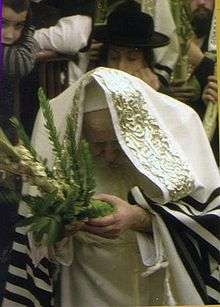Psalm 114
Psalm 114 is the 114th psalm of the Book of Psalms. In the Septuagint, it is combined with Psalm 115 into one psalm.[1]
Uses
Judaism

- Is one of six psalms (113-118) of which Hallel is composed. On all days when Hallel is recited, this psalm is recited in its entirety.[2]
- Is recited on the first and/or eighth days of Passover in some traditions.[3]
Christianity
Since the sixth century, the psalm has been used as a reading at Christian burial services, and also in ministry to those who are dying.[4] It has also been read at Easter Day services, as Israel's deliverance from slavery is seen as a metaphor for deliverance from sin.[5]
Protestant Christianity
In the Revised Common Lectionary, the Psalm appears in Year A on the seventeenth Sunday after Pentecost.[6]
Orthodox Christianity
In Slavic and Greek Orthodox churches, it is sung as an antiphon for the feast of Theophany,[7] for the following Sunday[8] and for Palm Sunday.[9]
Catholic
St. Benedict of Nursia choose this psalm as one of the Psalms sung for the offices of Vespers. Since the early Middle Ages, Psalm 114 has been performed at the office of Vespers on Monday, according to the rule of St. Benedict(530AD[10][11] The recite it continuously the following psalm verse to our Sed, which vivimus, benedicimus Domino hoc ex nunc and usque in Saeculum., Still as Psalm 11310.
In the Liturgy of Hours today, the first part of Psalm 114 is sung or recited Vespers Sunday but the first semaine11.
In popular culture
Part of the psalm is quoted at the beginning of Dante's Purgatorio.[12]
References
- Citations
- ↑ The Oxford Encyclopedia of the Books of the Bible. Oxford University Press. 2011. p. 194. ISBN 978-0-19-537737-8.
- ↑ The Complete Artscroll Siddur page 633
- ↑ The Artscroll Tehillim page 329
- ↑ Phillips 2001, p. 224-225.
- ↑ Phillips 2001, p. 225.
- ↑ Harn & Strawn 2009, p. 297.
- ↑ Psalm Verses of the Orthodox Liturgy 2000, p. 62.
- ↑ Psalm Verses of the Orthodox Liturgy 2000, p. 66.
- ↑ Psalm Verses of the Orthodox Liturgy 2000, p. 103.
- ↑ Règle de saint Benoît, (traduction par Prosper Guéranger, Abbaye Saint-Pierre de Solesmes, réimpression 2007) p47.
- ↑ Psautier latin-français du bréviaire monastique, 1938/2003 p493.
- ↑ Hamlin 2004, p. 108-109.
- Bibliography
- Hamlin, Hannibal (2004). Psalm Culture and Early Modern English Literature. Cambridge University Press. ISBN 978-0-521-83270-0.
- Harn, Roger E. Van; Strawn, Brent A. (2009). Psalms for Preaching and Worship: A Lectionary Commentary. Wm. B. Eerdmans Publishing. ISBN 978-0-8028-6321-8.
- Phillips, John (2001). Exploring Psalms: An Expository Commentary. Kregel Academic. ISBN 978-0-8254-3493-8.
- Psalm Verses of the Orthodox Liturgy: According to the Greek and Slav Usages. St Vladimir's Seminary Press. 2000. ISBN 978-1-879038-93-6.